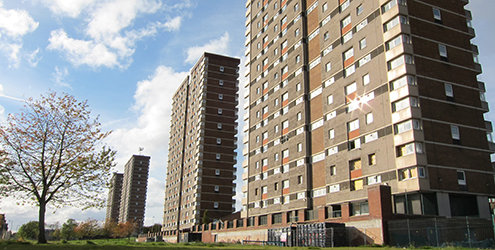Maarten van Ham (OTB) has achieved a resounding success with his award of an ERC grant worth 2 million euros. The professor in Urban Renewal, Faculty of Architecture and the Built Environment, is using this research grant to start an ambitious study into the relationship between socio-economic inequality, poverty and deprived neighbourhoods.
The European Research Council (ERC) chose Van Ham's research proposal DeprivedHoods from no fewer than 3673 applications. A decisive factor in their decision was Van Ham's multidisciplinary approach and unconventional, innovative methods: Van Ham intends to use longitudinal data from four different countries to explore the extent to which a deprived neighbourhood affects the opportunities of its individual residents.
It is generally assumed that the negative effects are considerable; those living in a neighbourhood with high unemployment and few amenities are thought to have little chance of success in the labour market and at school. This is in part because they lack good role models and social networks. "However, a causal relationship for this has never been scientifically shown, despite the huge amount of research that has been carried out in this field", says Van Ham. "My proposal provides a method for establishing relationships."
Crucial to the research is the use of data that is not generally available. Research into social processes tends to use cross-sectional data, but the disadvantage of using this type of data on the population is that they only provide snapshot information. Van Ham is adopting a different approach: during the next five years he will be examining data that map out the entire life-cycle of residents. For example, housing moves, employment history, social mobility and developments in the residential/domestic environment.
Approach
Is it true that people are held back in life by the built environment they are trapped in? Or do the unemployed move to deprived neighbourhoods because of the plentiful cheap social housing there? Answers to questions such as these could throw new light on the way the different public authorities approach deprived neighbourhoods. In the Netherlands there has been a great deal of demolition in old neighbourhoods in recent decades to make way for more expensive housing, aimed at attracting affluent residents who would give a strong boost to neighbourhoods with unequal opportunities. But is there convincing evidence that this approach works? Van Ham questions this social engineering of cities. "Maybe this approach leads to the spread of inequality: you rob disadvantaged people from their network as well."
Developing statistical models and methods of analysis for the data collected is an important part of the DeprivedHoods research agenda. Just the amount of data collected from 'tiny' Sweden is enormous. With data from nine million inhabitants covering 20 years, the file contains 180 million lines which the researchers are subjecting to their computer models. During the coming years one part-time researcher per country will be working on the study in Sweden, Estonia and the United Kingdom. The lion's share of the research will take place in Delft, where four full-time researchers will be at work. The data analysis is subject to strict regulation as it concerns sensitive personal data.
Van Ham will be spending sixty per cent of his time on DeprivedHoods. He is wildly enthusiastic about the project: "How often does a researcher get the chance to spend two million euros in any way he wants on fundamental academic research? It's a unique opportunity."
